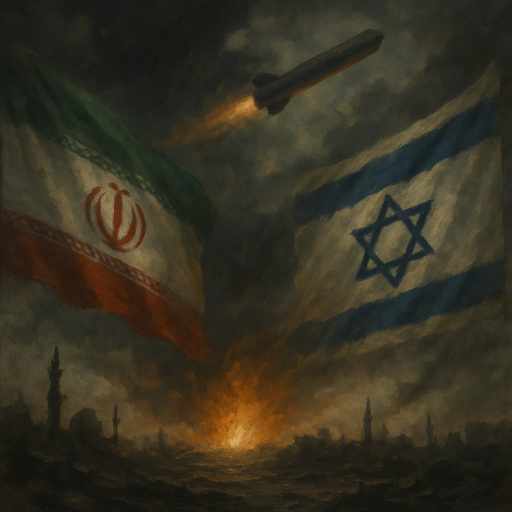The world once again finds itself at a crossroads where the power of diplomacy is fading, and the language of warfare is rising. Israel’s recent airstrikes on Iran’s nuclear and military installations are not merely tactical military operations—they are strategic moves on a vast geopolitical chessboard. At a time when the Middle East is already scarred by the devastation in Gaza and engulfed in the flames of the conflict in Yemen, this attack has sparked a fresh wave of tension across the region.
The Background to Israel’s Strike
Under the guise of national security, Israel launched a sudden and powerful airstrike aimed at crippling Iran’s nuclear capabilities. The targets were not just nuclear facilities but also individuals leading Iran’s nuclear weapons program. The attack was designed to send a clear message: Israel will not allow a hostile power in the region to achieve nuclear capability unchecked.
Iran’s Response
In retaliation, Iran fired over a hundred drones and ballistic missiles toward Israeli territory. However, most of these projectiles were intercepted and destroyed mid-air by Israel’s advanced defense systems. Still, this initial retaliation appears to be just the beginning. Analysts believe Iran is preparing a more coordinated and possibly prolonged response in the coming days.
Domestic Impact Inside Iran
The Israeli strike has also shaken the political landscape within Iran. Hardliners are using the attack to strengthen their grip on power, portraying themselves as defenders of the nation against an unjust global system. The public anger in Iran is directed not only at Israel but at the perceived hypocrisy of the international order, which they believe operates on double standards.
Regional Reactions and Diplomacy
Countries across the globe responded swiftly yet cautiously. China issued calls for restraint and warned its citizens to avoid travel to both Iran and Israel. Russia condemned Israel’s actions, labeling them a threat to regional stability. One of the most surprising developments was Saudi Arabia’s criticism of Israel—a rare move that signals weakening of old alliances and the emergence of new regional realities.
In the context of improving Saudi-Iran relations and the Beijing-brokered peace agreement, Saudi Arabia’s shift is not entirely unexpected. Riyadh now positions itself as a representative of the broader Islamic world and cannot remain neutral on issues like Palestine any longer.
The United States’ Calculated Ambiguity
The United States, adhering to its classic diplomatic style, claimed it was not directly involved in the attack but reaffirmed its unwavering support for Israel’s right to self-defense. High-level security meetings were held at the White House, and American military bases in the region were placed on high alert. Although the U.S. is no longer the unconstrained superpower it once was, it still possesses significant diplomatic and military leverage. In this case, Washington may prefer limited conflict containment and strategic pressure rather than direct confrontation—especially as it navigates growing challenges from China and Russia.
What Could Come Next?
Iran’s future responses may go beyond missile strikes. Tehran could activate its vast proxy network—such as Hezbollah in Lebanon or Shia militias in Iraq—to launch a long, grinding asymmetric war. It may also create tension in the Strait of Hormuz, threatening global oil supply and destabilizing energy markets.
Another looming question is whether Iran might turn to North Korea for nuclear collaboration. Though alarming, the idea is not implausible. Both nations face similar international sanctions and may seek mutual benefits from cooperation. If Iran chooses this path, it could plunge the Middle East into a dangerous new nuclear crisis.
A Test for the Global Order
This unfolding crisis serves as a litmus test for the international system. The United Nations’ silence and the European Union’s soft, symbolic statements show the diminishing power of global institutions. They now serve more as advisory bodies than as enforcers of peace. For the West, especially the United States, it’s a moment of reckoning—granting unchecked freedom to allies could eventually render the global order ineffective.
Long-Term Consequences
In the long run, this conflict is likely to reshape regional dynamics. Israel may adopt an even more aggressive defense policy, while Iran will probably take its nuclear program deeper underground and enhance its security manifold. The current situation reflects more than a temporary clash—it hints at the beginning of a new Cold War in the Middle East.
If tensions continue to escalate, the repercussions will not remain confined to the region. The global economy, energy prices, and international political alignments could all be severely impacted.
Conclusion
The Middle East now stands on the brink of another violent era, where the weight of diplomatic words has faded, and the echo of bombs dominates. The Iran–Israel conflict is not simply the stubbornness of two states—it is the manifestation of competing global interests. Behind every missile lies a political message, and behind every official statement hides the threat of escalation.
America’s waning dominance, coupled with China’s and Russia’s quiet maneuvers, makes this geopolitical chessboard more complex than ever. The coming days may not just witness a military skirmish, but the collision of global ideologies. Iran’s nuclear ambitions and Israel’s nuclear supremacy have together held the region—and the world—hostage.
Let us hope the war ahead remains confined to words, not weapons.
Check More:
- Iran retaliation threat on israel
- Top 5 global military powers 2025
- Israel strikes Iran middle east tension

